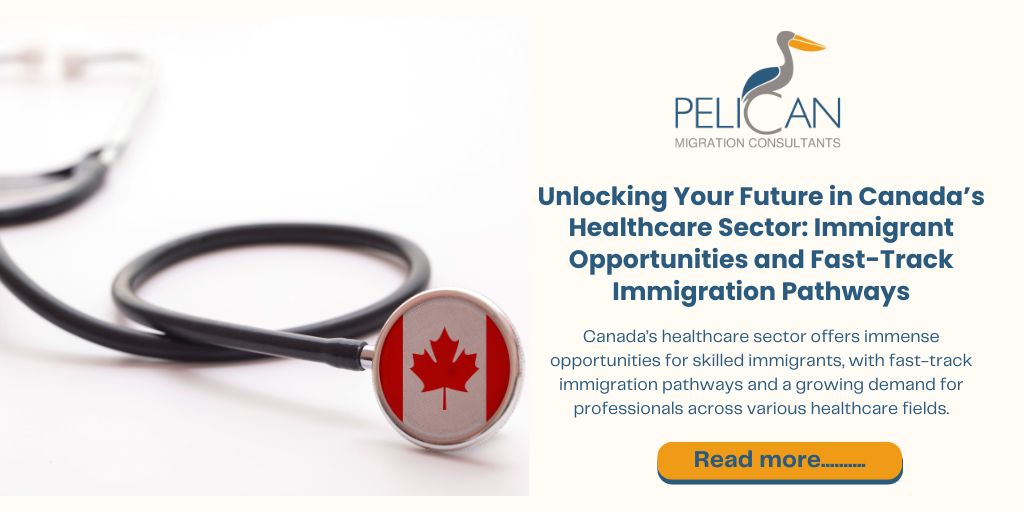
Unlocking Your Future in Canada’s Healthcare Sector: Immigrant Opportunities and Fast-Track Immigration Pathways
Canada’s healthcare system is world-renowned for its efficiency and accessibility, but the demand for healthcare professionals is growing due to an aging population and evolving medical needs. From physicians and nurses to medical technologists and healthcare administrators, the sector offers numerous opportunities for skilled professionals, particularly immigrants. The Canadian healthcare industry is one of the most immigration-friendly sectors, offering fast-track immigration pathways, provincial incentives, and support for professional integration. In this blog, we explore why healthcare professionals are in high demand in Canada and how skilled immigrants can navigate the country’s immigration programs like Express Entry and the Provincial Nominee Program (PNP) to secure their place in Canada’s thriving healthcare industry.
Why Immigrants Succeed in the Healthcare Industry in Canada
Canada’s healthcare system relies heavily on immigrants, who not only fill gaps in the workforce but also bring valuable skills and diverse perspectives that enhance healthcare delivery across the country. Immigrants are a crucial part of addressing the chronic shortage of healthcare professionals, especially in regions where demand exceeds supply.
Immigrants succeed in the Canadian healthcare industry for several reasons:
- Fast-track immigration pathways: Programs like Express Entry and PNP are tailored to prioritize healthcare professionals, facilitating their migration to Canada.
- Credential recognition: Canada’s system ensures that internationally trained professionals can have their qualifications recognized, allowing them to practice medicine, nursing, and other healthcare-related professions in the country.
- Regional incentives: Some provinces provide additional support and benefits to healthcare professionals willing to work in underserved areas, making it easier for immigrants to settle in high-demand regions.
- Mentorship programs: These programs allow immigrants to integrate smoothly into the Canadian healthcare system by pairing them with experienced professionals who provide guidance on local practices and standards.
Chronic Shortages in Healthcare
Canada’s healthcare sector is facing a significant challenge: a shortage of professionals. This issue is primarily caused by the combination of an aging population, an increase in chronic illnesses, and a growing need for healthcare services. Many healthcare professionals are also approaching retirement age, which exacerbates the shortage.
In particular, professions such as registered nurses, medical laboratory technologists, physicians, pharmacists, and healthcare administrators are in high demand. As the need for healthcare services continues to rise, immigrants play a critical role in ensuring that there are enough skilled professionals to meet the demand. The Canadian government recognizes this need and has structured its immigration policies to attract healthcare workers from around the world.
Regulatory Pathways for Healthcare Professionals
Canada offers a number of immigration programs that prioritize healthcare professionals. Two of the most widely used immigration pathways for healthcare workers are Express Entry and the Provincial Nominee Program (PNP). These programs are specifically designed to help healthcare professionals gain permanent residency and begin working in their field as soon as possible.
Express Entry
The Express Entry system is one of the fastest ways to gain permanent residency in Canada. It is based on a points system that evaluates candidates based on factors like age, education, work experience, and language proficiency. Healthcare professionals can benefit greatly from Express Entry, as the system prioritizes skilled workers, including those with experience in the healthcare sector.
The Federal Skilled Worker Program (FSWP), one of the three immigration streams under Express Entry, is particularly relevant to healthcare professionals. It is designed for individuals with work experience in specific occupations that contribute to Canada's economic growth, including healthcare roles. To qualify, applicants must meet specific criteria, such as:
- Minimum work experience: At least one year of full-time work experience in a healthcare-related occupation.
- Language proficiency: Candidates must demonstrate their proficiency in English or French by taking a language test.
- Education: Applicants must have at least a high school diploma or an equivalent educational credential.
The Express Entry Comprehensive Ranking System (CRS) is used to assess and rank candidates. Those who score the highest points are invited to apply for permanent residency through regular draws from the pool. Healthcare professionals, given their high demand, often score well in the Express Entry system, increasing their chances of receiving an Invitation to Apply (ITA).
Provincial Nominee Program (PNP)
In addition to Express Entry, the Provincial Nominee Program (PNP) is another excellent pathway for healthcare professionals seeking to migrate to Canada. Each province in Canada runs its own PNP, which allows them to nominate skilled professionals for permanent residency. These programs are often used to fill labor shortages in specific provinces or regions.
Healthcare professionals can apply for a PNP if they have skills in high-demand professions like nursing, medicine, or medical technology. The advantage of the PNP is that it offers additional points towards the Express Entry CRS score, making it easier for healthcare professionals to secure an ITA for permanent residency.
Each province has its own criteria for selecting nominees, but most healthcare professionals can find a province where their skills are needed. For example:
- British Columbia offers a Health Care Professional Stream, which is tailored to healthcare workers with job offers in the province.
- Ontario has a Human Capital Priorities Stream that selects healthcare professionals from the Express Entry pool with a high CRS score.
- Alberta has its Alberta Opportunity Stream, which allows healthcare professionals to apply for permanent residency if they meet the province’s labor market needs.
By applying for the PNP, healthcare professionals can significantly enhance their chances of gaining permanent residency, especially if they have a job offer from a Canadian employer in the healthcare sector.
Regional Incentives for Healthcare Workers
To further encourage healthcare professionals to work in areas with acute shortages, some provinces offer regional incentives. These incentives are designed to make it more attractive for healthcare workers to live and work in underserved areas of the country.
For example, provinces like British Columbia, Alberta, and Manitoba offer relocation assistance, housing subsidies, and financial incentives to attract healthcare workers. In many cases, these regions have high demand for healthcare professionals but face challenges in attracting enough skilled workers to meet the needs of their populations.
These provincial incentives help ensure that healthcare workers are evenly distributed across Canada, improving healthcare access in all regions, including rural and remote areas. For immigrants, these regional incentives can make a significant difference in their decision to relocate, providing additional support as they establish their careers in Canada.
High-Demand Roles in Canada’s Healthcare Sector
Canada’s healthcare industry offers a wide range of opportunities for skilled professionals. Some of the most in-demand roles in the healthcare sector include:
- Registered Nurses (RNs) – NOC 31301
Nurses are in high demand across Canada, particularly in hospitals, clinics, and long-term care facilities. Nurses play a crucial role in delivering patient care, administering medications, and ensuring the well-being of patients. - Physicians – NOC 31102
Canada’s healthcare system needs more doctors to address the growing demand for medical services, especially in underserved areas. Physicians are responsible for diagnosing and treating a wide range of illnesses and conditions. - Pharmacists – NOC 31120
Pharmacists play an important role in dispensing medications, advising patients on the use of prescriptions, and ensuring the safe and effective use of pharmaceuticals. There is a consistent demand for pharmacists in Canada, particularly in community and hospital settings. - Medical Laboratory Technologists – NOC 32120
Medical laboratory technologists are responsible for conducting tests and analyzing samples to diagnose and monitor medical conditions. These professionals are essential to the diagnostic process and are in high demand in Canada.
Challenges and Solutions for Immigrants in the Canadian Healthcare Sector
While Canada offers excellent opportunities for healthcare professionals, immigrants often face challenges when transitioning to the Canadian workforce. Some of the common challenges include:
Licensing and Certification
To practice in Canada, immigrants must have their credentials assessed and meet Canadian licensing requirements. Each province has different licensing procedures, which can sometimes cause delays in the immigration process. However, many provinces offer bridging programs that help healthcare professionals gain the necessary qualifications to work in Canada.
Mentorship Programs
Mentorship programs are available to help immigrants adjust to the Canadian healthcare system. These programs pair newcomers with experienced healthcare professionals who can guide them through the nuances of Canadian practices and offer practical advice.
Get Ready for Canadian Immigration Success
Canada’s healthcare sector offers incredible opportunities for skilled immigrants, particularly those in high-demand professions like nursing, medicine, and medical technology. By utilizing immigration pathways like Express Entry and the Provincial Nominee Program (PNP), healthcare professionals can streamline their journey to permanent residency in Canada.
Pelican Migration Consultants can assist you in navigating the complex immigration process, ensuring that you take full advantage of Canada’s immigration programs. With our expertise in healthcare immigration, we can help you secure the necessary qualifications, find the right immigration pathway, and settle into your new role in Canada’s healthcare sector.
Contact Pelican Migration Consultants for a free online assessment and start your journey towards a rewarding career in Canada’s healthcare industry today.


